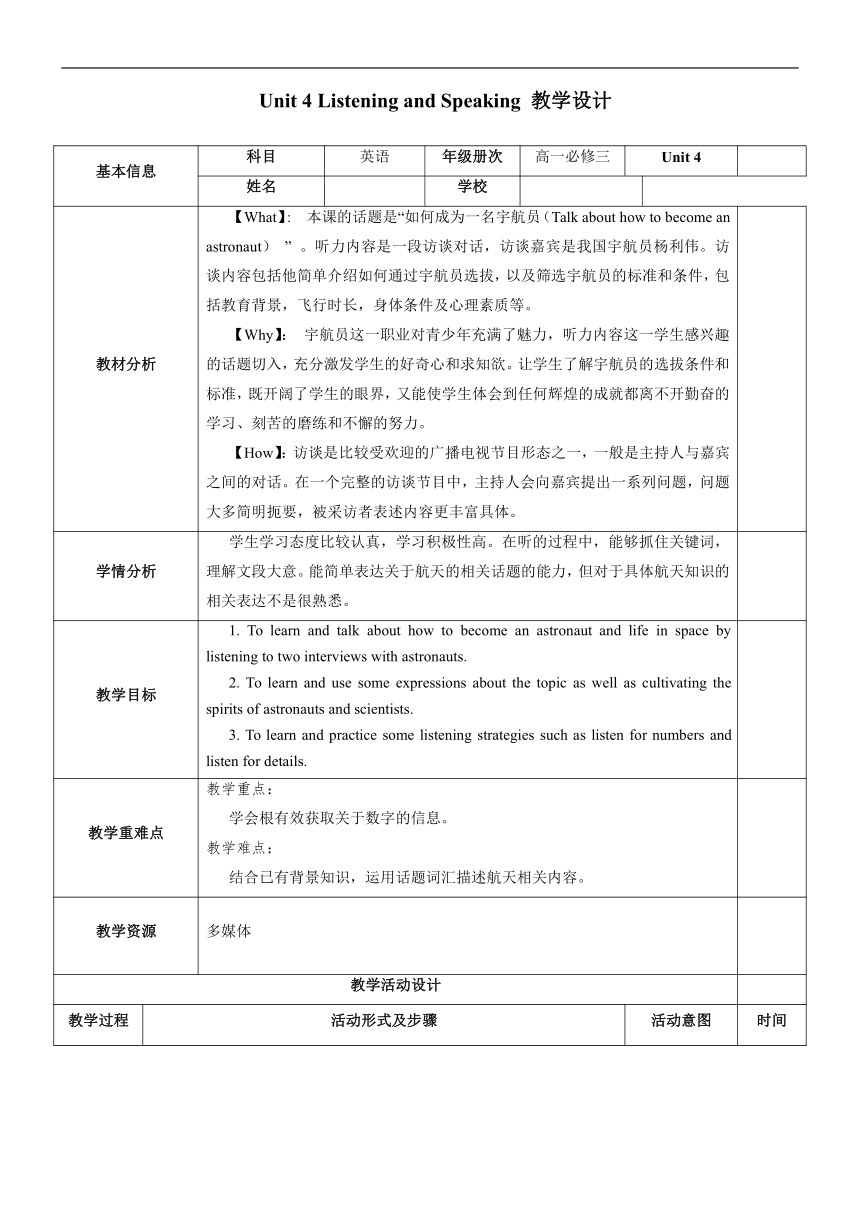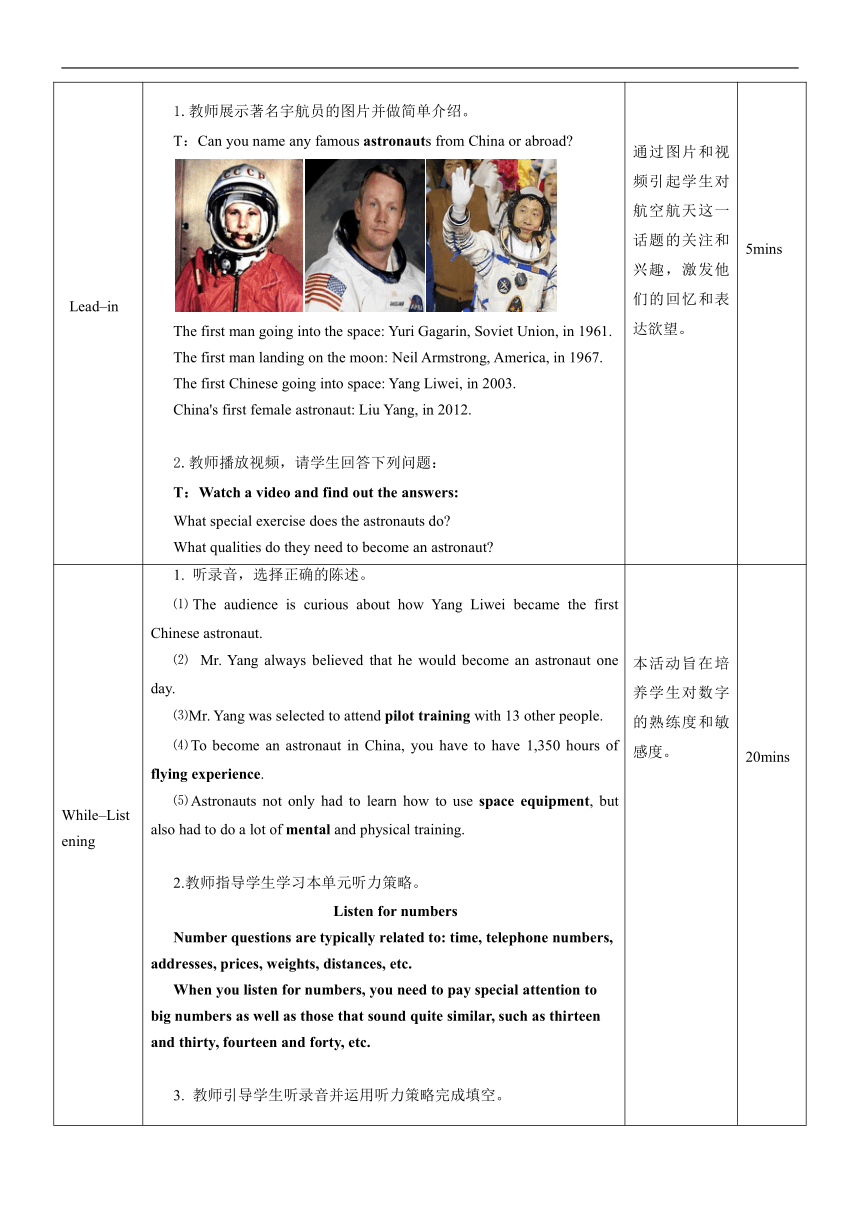人教版(2019)必修 第三册Unit 4 Space Exploration Listenting and speaking教学设计(表格式)
文档属性
| 名称 | 人教版(2019)必修 第三册Unit 4 Space Exploration Listenting and speaking教学设计(表格式) |  | |
| 格式 | docx | ||
| 文件大小 | 876.9KB | ||
| 资源类型 | 教案 | ||
| 版本资源 | 人教版(2019) | ||
| 科目 | 英语 | ||
| 更新时间 | 2024-03-20 11:56:37 | ||
图片预览


文档简介
Unit 4 Listening and Speaking 教学设计
基本信息 科目 英语 年级册次 高一必修三 Unit 4
姓名 学校
教材分析 【What】: 本课的话题是“如何成为一名宇航员(Talk about how to become an astronaut) ” 。听力内容是一段访谈对话,访谈嘉宾是我国宇航员杨利伟。访谈内容包括他简单介绍如何通过宇航员选拔,以及筛选宇航员的标准和条件,包括教育背景,飞行时长,身体条件及心理素质等。 【Why】: 宇航员这一职业对青少年充满了魅力,听力内容这一学生感兴趣的话题切入,充分激发学生的好奇心和求知欲。让学生了解宇航员的选拔条件和标准,既开阔了学生的眼界,又能使学生体会到任何辉煌的成就都离不开勤奋的学习、刻苦的磨练和不懈的努力。 【How】:访谈是比较受欢迎的广播电视节目形态之一,一般是主持人与嘉宾之间的对话。在一个完整的访谈节目中,主持人会向嘉宾提出一系列问题,问题大多简明扼要,被采访者表述内容更丰富具体。
学情分析 学生学习态度比较认真,学习积极性高。在听的过程中,能够抓住关键词,理解文段大意。能简单表达关于航天的相关话题的能力,但对于具体航天知识的相关表达不是很熟悉。
教学目标 1. To learn and talk about how to become an astronaut and life in space by listening to two interviews with astronauts. 2. To learn and use some expressions about the topic as well as cultivating the spirits of astronauts and scientists. 3. To learn and practice some listening strategies such as listen for numbers and listen for details.
教学重难点 教学重点: 学会根有效获取关于数字的信息。 教学难点: 结合已有背景知识,运用话题词汇描述航天相关内容。
教学资源 多媒体
教学活动设计
教学过程 活动形式及步骤 活动意图 时间
Lead–in 1.教师展示著名宇航员的图片并做简单介绍。 T:Can you name any famous astronauts from China or abroad The first man going into the space: Yuri Gagarin, Soviet Union, in 1961. The first man landing on the moon: Neil Armstrong, America, in 1967. The first Chinese going into space: Yang Liwei, in 2003. China's first female astronaut: Liu Yang, in 2012. 2.教师播放视频,请学生回答下列问题: T:Watch a video and find out the answers: What special exercise does the astronauts do What qualities do they need to become an astronaut 通过图片和视频引起学生对航空航天这一话题的关注和兴趣,激发他们的回忆和表达欲望。 5mins
While–Listening 1. 听录音,选择正确的陈述。 ⑴The audience is curious about how Yang Liwei became the first Chinese astronaut. ⑵ Mr. Yang always believed that he would become an astronaut one day. ⑶Mr. Yang was selected to attend pilot training with 13 other people. ⑷To become an astronaut in China, you have to have 1,350 hours of flying experience. ⑸Astronauts not only had to learn how to use space equipment, but also had to do a lot of mental and physical training. 2.教师指导学生学习本单元听力策略。 Listen for numbers Number questions are typically related to: time, telephone numbers, addresses, prices, weights, distances, etc. When you listen for numbers, you need to pay special attention to big numbers as well as those that sound quite similar, such as thirteen and thirty, fourteen and forty, etc. 3. 教师引导学生听录音并运用听力策略完成填空。 T: Listen again and fill in the blanks with the correct numbers. ⑴Yang Liwei graduated from college at the age of ________. ⑵Before he joined China’s space programme, Mr Yang trained as a fighter pilot for ____ years. ⑶ Mr Yang was one of the _____ pilots who were chosen to train for space flights. ⑷ At the time when Mr Yang entered the space programme, astronauts had to be shorter than ________ cm in height and less than ____ kg in weight. ⑸Mr Yang became China’s first astronaut when he was _____ years old. 4.教师引导学生再听录音,然后根据内容完成表格。 T:Listen to the interview again and make a list of the requirements for becoming an astronaut. Education background:____________________________________ Experience:______________________________________________ Health condition:__________________________________________ _________________________________________ Courses:_________________________________________________ Special training:__________________________________________ 本活动旨在培养学生对数字的熟练度和敏感度。 帮助学生熟悉航空航天需用到的相关表达,巩固知识点。 20mins
Speaking 教师将学生分成4人一组进行小组讨论。 T:Work in pairs. Discuss whether you would like to be an astronaut in the future and give your reasons. Use what you have learnt from the interview to help you. Example: A: You know, I think being an astronaut would be cool. B: Do you want to work in space in the future A: I’m not sure, but I think it might be too difficult for me. There are so many requirements. First of all, you must be intelligent enough to get a related college degree. Then you have to be a pilot with years of training and practice flying. Finally, you must be really physically fit. B: So what might be the most difficult part for you A: I guess it might be space travel itself. I'm sure being weightless must be fun, and it would be wonderful to see the Earth and stars from space. But the spacesuit and capsule look terribly small and uncomfortable. It would be hard to stay in such a small space for so long. Also, there’s no privacy at all. What if I have to go to the restroom B: I see what you mean. 本阶段的学习活动引导学生在归纳和整理核心语言的基础上,通过对话表演将语言内化,从学习理解过渡到应用实践。 10mins
4.单词的重读音节 1. 学生听并跟读Pronunciation部分所给单词,归纳所给单词的发音规律。 2. 学生再听第一段材料,从中找出其他类似单词。 3. 学生brainstorm其他符合发音规律的单词。(此项也可留作课后作业。) 学生通过跟读关注单词发音,归纳总结语音同化规律。 5mins
Homework: 1. 听录音,跟读全部对话。 2. 跟同学讨论宇航员选拔的标准和条件。 3. 为Pronunciation部分每组读音补充至少1个例词。 课后反思 通过学习: 1. 学生提升了对数字的敏感度和熟练度; 2. 学生能综合所学知识,独自阐述选拔宇航员的标准和条件。 本节课是听说课,结合单元的主题语境和单元的主要学习任务,在导入部分带领学生理解并讨论主题图,激发学生的学习兴趣。通过听力活动的训练,引导学生通过关注数字的信息,并掌握关于航天的相关表达。在教学过程中,采用互动合作的形式教学,发挥学生的主导作用。
基本信息 科目 英语 年级册次 高一必修三 Unit 4
姓名 学校
教材分析 【What】: 本课的话题是“如何成为一名宇航员(Talk about how to become an astronaut) ” 。听力内容是一段访谈对话,访谈嘉宾是我国宇航员杨利伟。访谈内容包括他简单介绍如何通过宇航员选拔,以及筛选宇航员的标准和条件,包括教育背景,飞行时长,身体条件及心理素质等。 【Why】: 宇航员这一职业对青少年充满了魅力,听力内容这一学生感兴趣的话题切入,充分激发学生的好奇心和求知欲。让学生了解宇航员的选拔条件和标准,既开阔了学生的眼界,又能使学生体会到任何辉煌的成就都离不开勤奋的学习、刻苦的磨练和不懈的努力。 【How】:访谈是比较受欢迎的广播电视节目形态之一,一般是主持人与嘉宾之间的对话。在一个完整的访谈节目中,主持人会向嘉宾提出一系列问题,问题大多简明扼要,被采访者表述内容更丰富具体。
学情分析 学生学习态度比较认真,学习积极性高。在听的过程中,能够抓住关键词,理解文段大意。能简单表达关于航天的相关话题的能力,但对于具体航天知识的相关表达不是很熟悉。
教学目标 1. To learn and talk about how to become an astronaut and life in space by listening to two interviews with astronauts. 2. To learn and use some expressions about the topic as well as cultivating the spirits of astronauts and scientists. 3. To learn and practice some listening strategies such as listen for numbers and listen for details.
教学重难点 教学重点: 学会根有效获取关于数字的信息。 教学难点: 结合已有背景知识,运用话题词汇描述航天相关内容。
教学资源 多媒体
教学活动设计
教学过程 活动形式及步骤 活动意图 时间
Lead–in 1.教师展示著名宇航员的图片并做简单介绍。 T:Can you name any famous astronauts from China or abroad The first man going into the space: Yuri Gagarin, Soviet Union, in 1961. The first man landing on the moon: Neil Armstrong, America, in 1967. The first Chinese going into space: Yang Liwei, in 2003. China's first female astronaut: Liu Yang, in 2012. 2.教师播放视频,请学生回答下列问题: T:Watch a video and find out the answers: What special exercise does the astronauts do What qualities do they need to become an astronaut 通过图片和视频引起学生对航空航天这一话题的关注和兴趣,激发他们的回忆和表达欲望。 5mins
While–Listening 1. 听录音,选择正确的陈述。 ⑴The audience is curious about how Yang Liwei became the first Chinese astronaut. ⑵ Mr. Yang always believed that he would become an astronaut one day. ⑶Mr. Yang was selected to attend pilot training with 13 other people. ⑷To become an astronaut in China, you have to have 1,350 hours of flying experience. ⑸Astronauts not only had to learn how to use space equipment, but also had to do a lot of mental and physical training. 2.教师指导学生学习本单元听力策略。 Listen for numbers Number questions are typically related to: time, telephone numbers, addresses, prices, weights, distances, etc. When you listen for numbers, you need to pay special attention to big numbers as well as those that sound quite similar, such as thirteen and thirty, fourteen and forty, etc. 3. 教师引导学生听录音并运用听力策略完成填空。 T: Listen again and fill in the blanks with the correct numbers. ⑴Yang Liwei graduated from college at the age of ________. ⑵Before he joined China’s space programme, Mr Yang trained as a fighter pilot for ____ years. ⑶ Mr Yang was one of the _____ pilots who were chosen to train for space flights. ⑷ At the time when Mr Yang entered the space programme, astronauts had to be shorter than ________ cm in height and less than ____ kg in weight. ⑸Mr Yang became China’s first astronaut when he was _____ years old. 4.教师引导学生再听录音,然后根据内容完成表格。 T:Listen to the interview again and make a list of the requirements for becoming an astronaut. Education background:____________________________________ Experience:______________________________________________ Health condition:__________________________________________ _________________________________________ Courses:_________________________________________________ Special training:__________________________________________ 本活动旨在培养学生对数字的熟练度和敏感度。 帮助学生熟悉航空航天需用到的相关表达,巩固知识点。 20mins
Speaking 教师将学生分成4人一组进行小组讨论。 T:Work in pairs. Discuss whether you would like to be an astronaut in the future and give your reasons. Use what you have learnt from the interview to help you. Example: A: You know, I think being an astronaut would be cool. B: Do you want to work in space in the future A: I’m not sure, but I think it might be too difficult for me. There are so many requirements. First of all, you must be intelligent enough to get a related college degree. Then you have to be a pilot with years of training and practice flying. Finally, you must be really physically fit. B: So what might be the most difficult part for you A: I guess it might be space travel itself. I'm sure being weightless must be fun, and it would be wonderful to see the Earth and stars from space. But the spacesuit and capsule look terribly small and uncomfortable. It would be hard to stay in such a small space for so long. Also, there’s no privacy at all. What if I have to go to the restroom B: I see what you mean. 本阶段的学习活动引导学生在归纳和整理核心语言的基础上,通过对话表演将语言内化,从学习理解过渡到应用实践。 10mins
4.单词的重读音节 1. 学生听并跟读Pronunciation部分所给单词,归纳所给单词的发音规律。 2. 学生再听第一段材料,从中找出其他类似单词。 3. 学生brainstorm其他符合发音规律的单词。(此项也可留作课后作业。) 学生通过跟读关注单词发音,归纳总结语音同化规律。 5mins
Homework: 1. 听录音,跟读全部对话。 2. 跟同学讨论宇航员选拔的标准和条件。 3. 为Pronunciation部分每组读音补充至少1个例词。 课后反思 通过学习: 1. 学生提升了对数字的敏感度和熟练度; 2. 学生能综合所学知识,独自阐述选拔宇航员的标准和条件。 本节课是听说课,结合单元的主题语境和单元的主要学习任务,在导入部分带领学生理解并讨论主题图,激发学生的学习兴趣。通过听力活动的训练,引导学生通过关注数字的信息,并掌握关于航天的相关表达。在教学过程中,采用互动合作的形式教学,发挥学生的主导作用。
